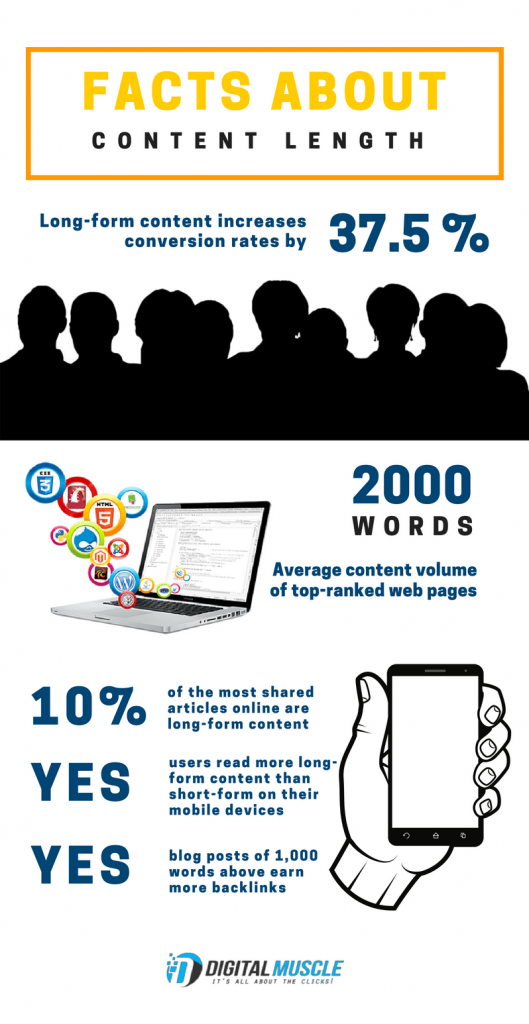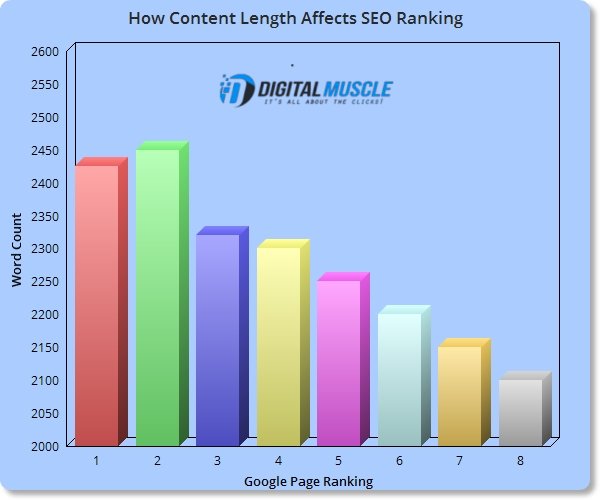Saying that long-form content and lengthy blog posts are a thing of the past would be too presumptuous. True, attention spans have drastically declined. But does that mean you have to reduce your content length just to resolve attention span issues?
Present technological innovations are a reflection of today's "I want it now" generation. Decades ago everyone went out of their way to find information. But the status quo has changed since then. Now the Internet spoon-feeds answers to almost anything.
Wait. So no one reads in-depth articles anymore? Could you possibly relay enough information about your business in just 200 to 500 words? What if you have so many products and services to talk about?
And so you find yourself in a dilemma.
Long-Form Content vs. Short-Form Content

Should you focus on long-form content that gives real value to potential customers and search engine crawlers? Or would it be better to publish shorter, easy-to-read content that spares your readers from boredom? Before answering these questions, let's clarify some misnomers.
First, lengthy blog posts are not always synonymous with good content. Second, shorter articles do not always create a better reader experience. This sounds like a catch-22 scenario.
With all these SEO gurus, tech nerds and content marketers giving their two cents on content length, it's hard to arrive at a definite standard. We do know that if you want to generate content that's worth your readers' time, you have to start paying attention to the following:
➤ target audience (choose appropriate age groups, genders, work background, population size) ➤ communication style (different readers may require different writing tones) ➤ topic difficulty (some topics are easier to write than others) ➤ customers' most frequently asked questions ➤ format (e.g. long paragraphs give off an air of difficulty while short ones appear easier to read) ➤ thought coherence (how clearly you express your thoughts) ➤ empathy (whether you can put yourself in the shoes of your readers) ➤ intent (purpose for writing the content)
More factors are at play here than what we've just outlined. If you're writing personal content, then it doesn't matter if you're writing a long or short article.
But what if you want to promote your business online or make your website appear on search engines? If you have complied with the items listed above, does that mean you've generated quality content?
Allow us to expound further.
What is Quality Content?

More often than not, quality content and long posts go hand in hand. It's rare to find them on the other side of the spectrum.
While you can report about events, people and simple topics in just 300 to 500 words, you can't exactly do that when you're trying to explain ideas, topics, situations and processes. Because then you'd have a lot of subtracting and streamlining to do. The most you'll accomplish is write generic content.
And yes, at times a short article can provide more information than a 2000-word blog post. When written by less experienced writers, long articles can sound repetitive, exaggerated or gibberish. Short articles, on one hand, tend make readers feel like they've only seen the tip of the iceberg.
Let's just say quality content, in a nutshell, is content that meets your clients' information needs. Regardless of length, if what you're reading expands your understanding or resolves some nagging questions, then hands down it's quality content.
What Google Says About Content Length
Earlier we mentioned about quality content and long posts being on the same spectrum. Google itself has pretty much confirmed this. Without a proper context, quality content can take on any form.
But what if you want your web content to rank well on search engine results and attract more customers? How do you bridge the gap between content length and SEO?
It's a no-brainer. Do what Google says.
The world's number 1 search engine changes its core algorithms from time to time. And everyone's going crazy keeping up. Surprisingly, Google has always been consistent when it comes content.
Check out the infographic below to see important statistics related to content length:

It's not telling you outright but statistics show that Google will always favour long-form content. And there are justifiable reasons behind this preference.
Search engines prefer quality long-form content because their algorithms can extract more keywords. And when a page has more related keywords, it's easier for algorithms to identify which neighbourhood your website belongs to.
The graph below shows the relationship between word count and Google search results page ranking:

How to Write Content for Google
Okay, the cat's out of the bag. But there's another catch: publishing frequency.
You may have written a super technical article spanning 2,500 words. However, your next publishing schedule would be in three weeks. Your biggest competitor on one hand publishes 1,000 to 1,500-word articles every other day.
This is not to say you're out of the race just because they're more consistent. But just imagine if they have well-written content that gives the right kind of information to the same target audience.
Publishing frequency is about feeding new target keywords and pieces of information to search engines. And if your published content fulfills user needs, a Google algorithm named Panda will subsequently award more ranking points.
Basically, Google wants you to: 1. Prioritise long-form content 2. Write content that its algorithms can easily understand 3. Anticipate user questions and answer comprehensively 4. Provide genuine, accurate and timely information 5. Publish regularly
If you simply do as Google says, at the very least you'll be seeing results sooner than expected.
Do You Need Affordable SEO Services?
Content length is still relevant. Even people who dislike reading would always take the time to read a lengthy blog post that captures their interest. It's a matter of providing the right information to the people who really need it.
There's a science behind long-form content and why it works better for SEO. While 2000 words is the ideal, more than 1,000 words is actually the safe zone. Read more about the benefits of long-form content here.
Of course, there are other factors to consider as well. But the main challenge for content marketers is balancing content length with quality information, frequent publishing, user needs and Google standards.
If you're able to work out these dimensions without missing a beat, you'll be in Google's favour for a long time.
Are you ready to adjust your content length and increase your website's competitive edge? Do you think you can produce quality articles that will benefit readers or answer their nagging questions?
If you can spare some time to follow what Google says, then we salute you for that. And if this article has, in any way, inspired you to up the ante of your SEO campaign, then it's an honour.
However, if you're in a bind and would like some assistance, then we'll be glad to help you. We do not only offer holistic and affodable SEO services, we build campaigns that address your specific business needs.
To know more about our SEO company, please browse through our website https://www.digital-muscle.com.au/. You can also visit our Contact Us page for details on how to touch base with us.




